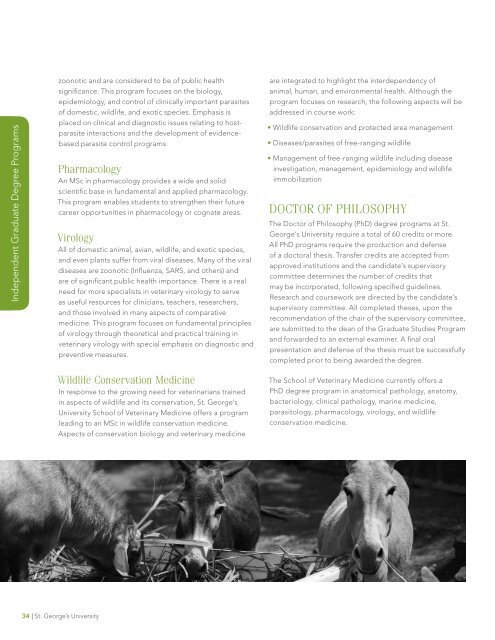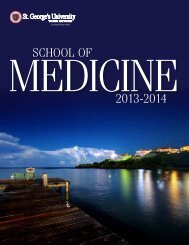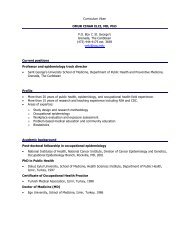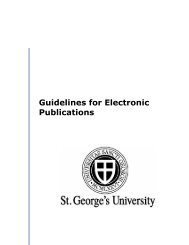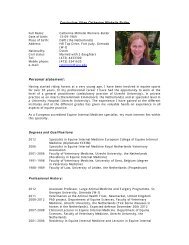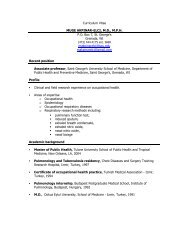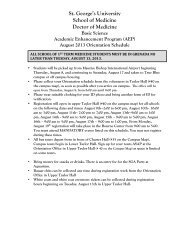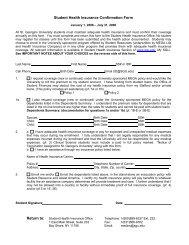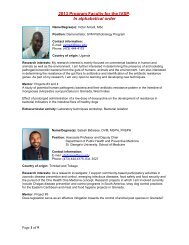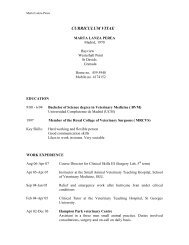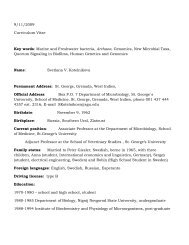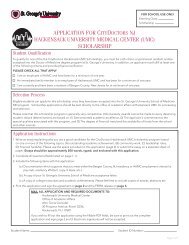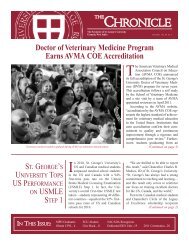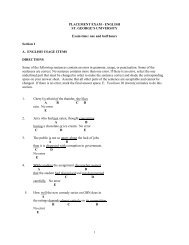SVM Catalogue 2012-2013 - St. George's University
SVM Catalogue 2012-2013 - St. George's University
SVM Catalogue 2012-2013 - St. George's University
Create successful ePaper yourself
Turn your PDF publications into a flip-book with our unique Google optimized e-Paper software.
School of Medicine<br />
Independent Graduate Degree Programs<br />
zoonotic and are considered to be of public health<br />
significance. This program focuses on the biology,<br />
epidemiology, and control of clinically important parasites<br />
of domestic, wildlife, and exotic species. Emphasis is<br />
placed on clinical and diagnostic issues relating to hostparasite<br />
interactions and the development of evidencebased<br />
parasite control programs.<br />
Pharmacology<br />
An MSc in pharmacology provides a wide and solid<br />
scientific base in fundamental and applied pharmacology.<br />
This program enables students to strengthen their future<br />
career opportunities in pharmacology or cognate areas.<br />
Virology<br />
All of domestic animal, avian, wildlife, and exotic species,<br />
and even plants suffer from viral diseases. Many of the viral<br />
diseases are zoonotic (Influenza, SARS, and others) and<br />
are of significant public health importance. There is a real<br />
need for more specialists in veterinary virology to serve<br />
as useful resources for clinicians, teachers, researchers,<br />
and those involved in many aspects of comparative<br />
medicine. This program focuses on fundamental principles<br />
of virology through theoretical and practical training in<br />
veterinary virology with special emphasis on diagnostic and<br />
preventive measures.<br />
Wildlife Conservation Medicine<br />
In response to the growing need for veterinarians trained<br />
in aspects of wildlife and its conservation, <strong>St</strong>. George’s<br />
<strong>University</strong> School of Veterinary Medicine offers a program<br />
leading to an MSc in wildlife conservation medicine.<br />
Aspects of conservation biology and veterinary medicine<br />
are integrated to highlight the interdependency of<br />
animal, human, and environmental health. Although the<br />
program focuses on research, the following aspects will be<br />
addressed in course work:<br />
• Wildlife conservation and protected area management<br />
• Diseases/parasites of free-ranging wildlife<br />
• Management of free-ranging wildlife including disease<br />
investigation, management, epidemiology and wildlife<br />
immobilization<br />
Doctor of Philosophy<br />
The Doctor of Philosophy (PhD) degree programs at <strong>St</strong>.<br />
George’s <strong>University</strong> require a total of 60 credits or more.<br />
All PhD programs require the production and defense<br />
of a doctoral thesis. Transfer credits are accepted from<br />
approved institutions and the candidate’s supervisory<br />
committee determines the number of credits that<br />
may be incorporated, following specified guidelines.<br />
Research and coursework are directed by the candidate’s<br />
supervisory committee. All completed theses, upon the<br />
recommendation of the chair of the supervisory committee,<br />
are submitted to the dean of the Graduate <strong>St</strong>udies Program<br />
and forwarded to an external examiner. A final oral<br />
presentation and defense of the thesis must be successfully<br />
completed prior to being awarded the degree.<br />
The School of Veterinary Medicine currently offers a<br />
PhD degree program in anatomical pathology, anatomy,<br />
bacteriology, clinical pathology, marine medicine,<br />
parasitology, pharmacology, virology, and wildlife<br />
conservation medicine.<br />
34 | <strong>St</strong>. George’s <strong>University</strong>


